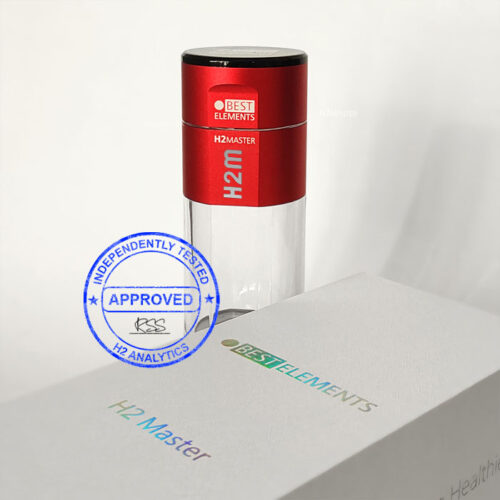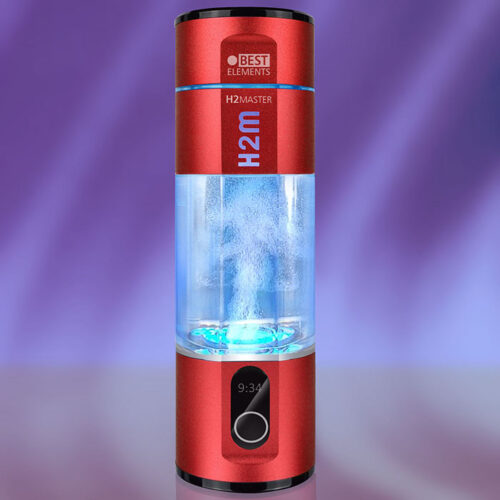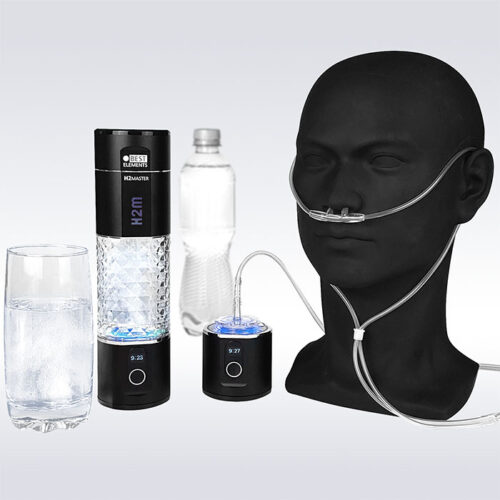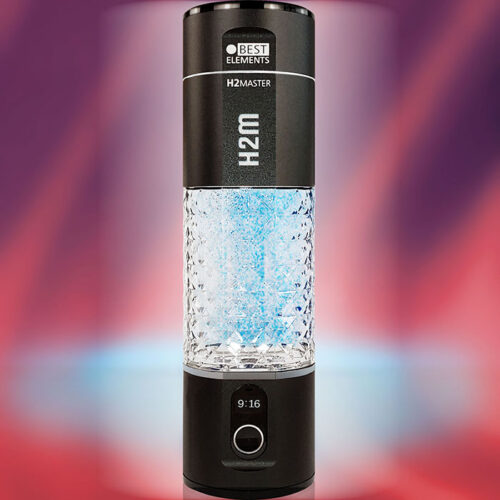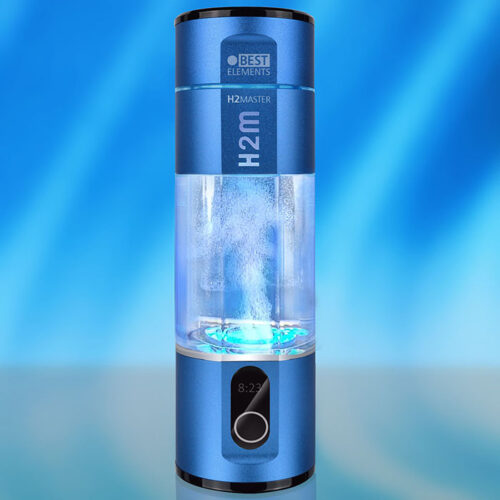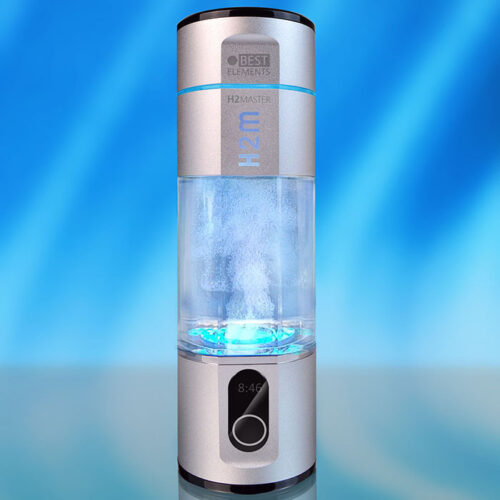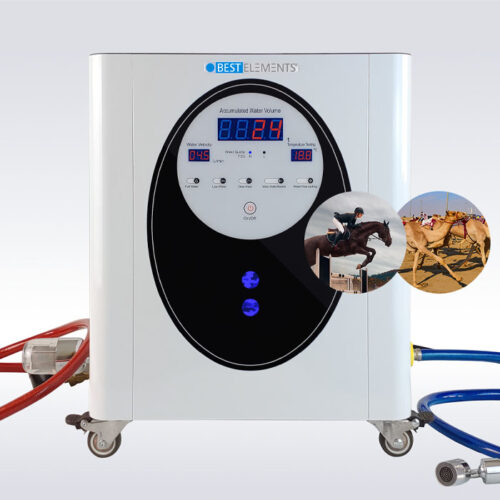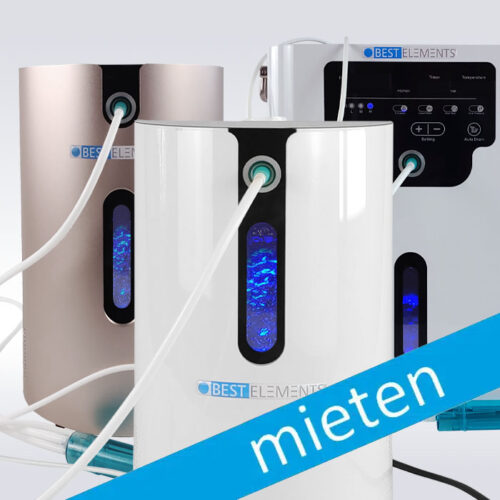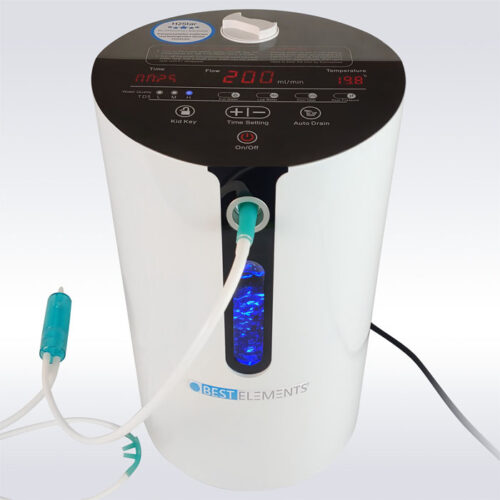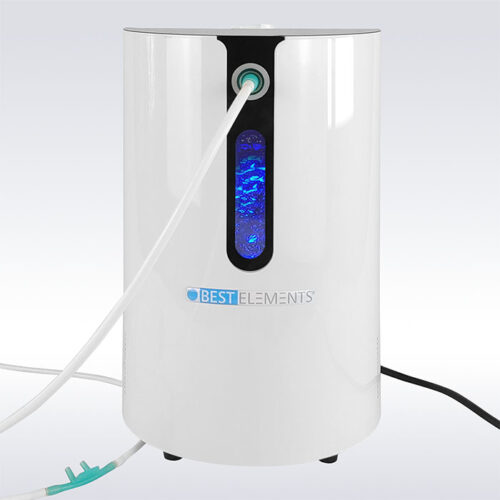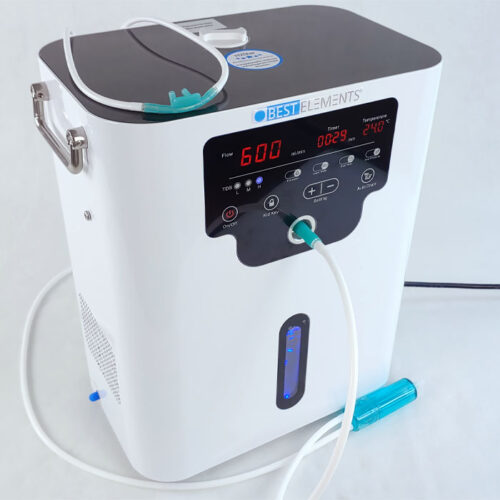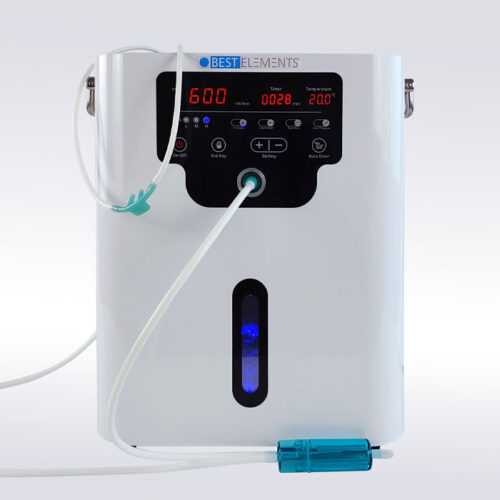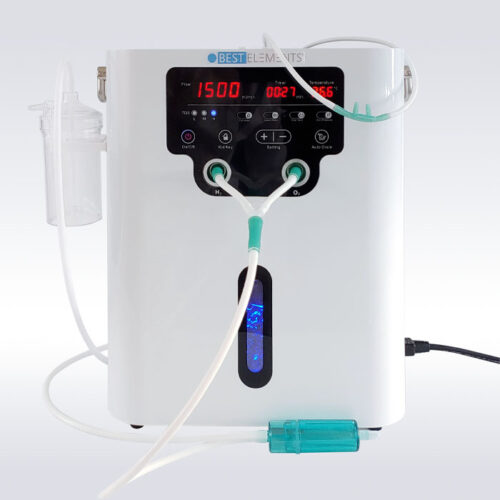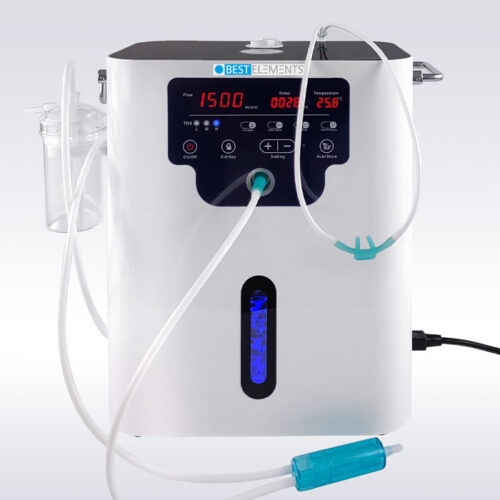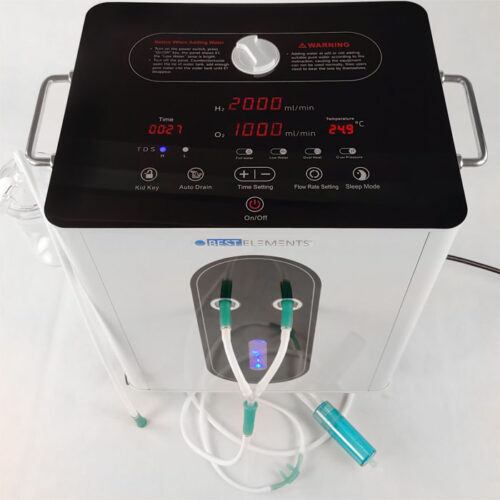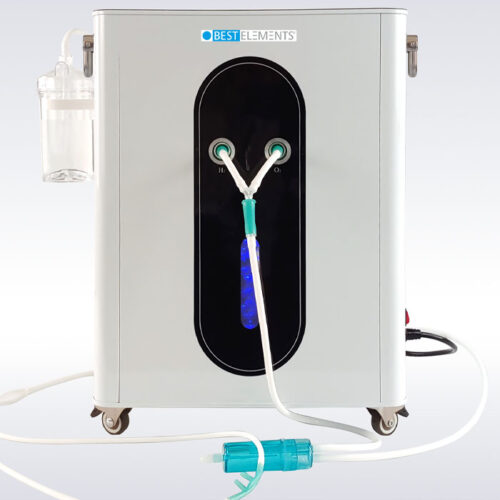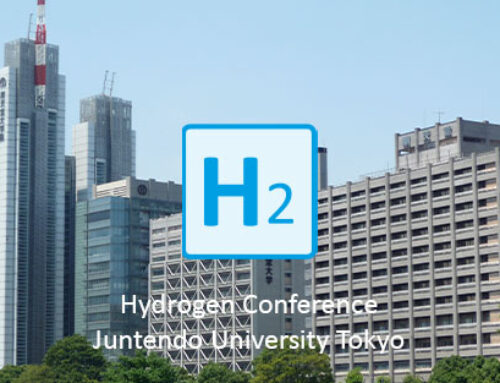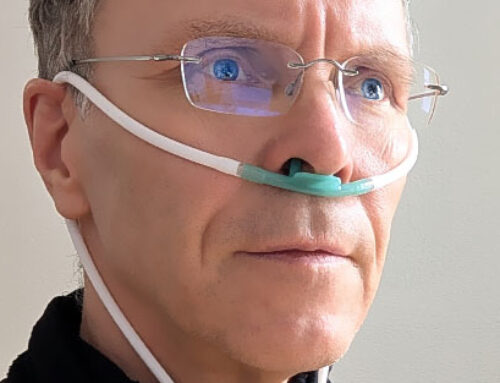Summary of the H2 Summit 2024: Hydrogen research in medical applications
Contributions and lectures make a deep impression and pave the way for innovations in hydrogen technology. Research and visions help to shape a more sustainable future in the field of hydrogen applications. We are grateful that the knowledge of hydrogen research is shared. Tyler W. Lebaron, Msc., PhD.
Prof. John Kheir, MD.
The use of hydrogen gas as a novel therapy to reduce ischaemic damage in patients undergoing extracorporeal cardiopulmonary resuscitation (ECPR) is being investigated. Professor John Kheir and his team have shown in preclinical studies that hydrogen gas significantly reduces neurological and renal damage following cardiac arrest. A Phase I clinical trial confirmed the safety of hydrogen administration via ventilators. The Hydrogen FAST trial is currently investigating the feasibility and safety of hydrogen therapy in patients with cardiac arrest. Preliminary data show promising results, indicating the potential of hydrogen gas as a life-saving therapeutic and paving the way for further clinical trials.
Prof. Shigeo Ohta, PhD.
Molecular hydrogen (H2) was long considered a biologically inert gas until a landmark paper in 2007 opened up the field of hydrogen medicine. H2 shows promising medical benefits as it has no cytotoxicity or side effects and offers great potential in the therapy of acute and chronic diseases, as well as in prevention and mental health. It can be consumed in a variety of ways, such as inhalation, drinking H2 water or application in other forms. H2 has antioxidant, anti-inflammatory and impacts energy metabolism and cell death, with oxidized porphyrins identified as possible targets. Overall, H2 has the potential to treat serious health problems and also have positive effects in areas such as sports, beauty and agriculture.
Prof. Sergej M. Ostojic, Md, Phd
Molecular hydrogen (H2) has emerged as a promising medical gas in neurology and neuroscience, with applications in Parkinson’s disease, stroke, traumatic brain injury and cancer. Preclinical and clinical studies are yielding positive results, and research is ongoing into the mechanism of action of H2 in the brain. The effects of H2 on neurotransmitters and brain metabolites, as well as its role in health and disease-related signaling pathways, are being further investigated.
Prof. Xuemei Ma, PhD.
The presentation “From Energy to Evolution: The Origin of Hydrogen Functions in Eukaryotes” highlights the central role of hydrogen in the evolution and biological functions of eukaryotic cells. It describes how hydrogen helped adapt to low-oxygen environments in early Earth history and today influences cellular processes such as inflammation reduction and stem cell activation. Research on hydrogenases and the versatile biological effects of hydrogen shows that its functions go beyond antioxidant properties and promotes the study of mechanisms in evolution and modern cellular functions.
Prof. Qianjun He, PhD.
Hydrogen molecules exhibit significant antioxidant and anti-inflammatory effects, making them a promising therapy for inflammation-related diseases. Current challenges in hydrogen medicine include understanding the mechanisms of action, in vivo detection, and targeted application. Our research has made significant progress, including the discovery of biological targets of H2, the development of an H2 bioprobe, and novel H2-releasing materials for the treatment of severe diseases.
Prof. Eugene Iv. Nazarov, Msc., PhD.
Medical gases such as oxygen, ozone, hydrogen and others exhibit different physiological activities that can be explained by their antioxidant and toxic properties. Hydrogen, xenon and ozone have similar pharmacological effects, although their chemical properties are different. These gases exhibit a spectrum of activities that is often characterized by their ability to influence the neuroendocrine system and activate the body’s homeostasis system. The studies show that the toxic burden of the gases is inversely related to their therapeutic effects, providing a rational basis for their combined use, especially in diseases such as inflammatory diseases and neurological disorders.
Another study extends the research on the use of medical gases in cardiac surgery in the treatment of valve defects by examining the combined effect of molecular hydrogen (H2) and nitric oxide (NO). While H2 has already shown cardioprotective effects, NO is used in surgery for vasodilation, although it can be toxic. The study shows that H2 can neutralize NO and thus preserve the cardioprotective benefits of NO, leading to improved cardiac function and better postoperative outcomes.
Prof. Svetlana N. Radyuk, PhD.
Hydrogen gas (H₂) shows promising therapeutic properties as an antioxidant and anti-inflammatory agent, and its protective mechanisms are being further investigated. In one study, H₂ was found to improve locomotor activity with reduced peroxiredoxins (Prx) and ALS-like symptoms. In addition, H₂ reduced oxidative damage and inflammation in atopic dermatitis. These results highlight the potential of H₂ in neurological and inflammatory diseases.
Prof. John Hancock, PhD.
Since the discovery of molecular hydrogen (H2) in the 18th century, when researchers such as Lavoisier and Priestley conducted initial experiments with gases, H2 has been increasingly studied for its biological effects. Although the exact interaction mechanisms of H2 with biological systems are not yet fully understood, research suggests that H2 may be useful, particularly through its antioxidant properties, especially in stressful situations such as disease or environmental toxins. The future applications of H2 could be in both medical therapy and agriculture. Molecular hydrogen (H2) shows positive effects on stressed biological systems, such as in disease or environmental pollution.
Prof. Li Ge, PhD.
Hydrogen medicine has been shown to be particularly effective in treating various conditions, including experimental colitis, where exogenous hydrogen gas treatment shows significant antioxidant, antiapoptotic and anti-inflammatory effects. Studies show that hydrogen-rich saline (HS) in sodium dextran sulfate (DSS)-induced acute colitis reduces symptoms such as weight loss and intestinal mucosal injury, promotes the production of short-chain fatty acids (SCFA), and strengthens the intestinal barrier, highlighting the importance of H2 in regulating the gut microbiota and alleviating colitis.
Prof. Wanchao Yang, MD, PhD.
Microglia-associated neuroinflammation contributes significantly to secondary brain injury after TBI. The study shows that molecular hydrogen (H2) reduces neuroinflammation and promotes M2 polarization of microglia by inhibiting histone deacetylase 5 (HDAC5). H2 thereby improves neurological outcome by modulating GSK3/AKT signaling via AMPK-dependent regulation, highlighting its therapeutic potential in traumatic brain injury.
Jiayuan Zhai, Phd-Studentin
Molecular hydrogen has shown therapeutic potential in neurological disorders such as neurodegenerative diseases and brain injuries, mainly through its antioxidant, anti-inflammatory and anti-apoptotic effects. Studies suggest that H₂ acts as a signaling molecule to regulate cellular pathways and improve neurological functions, particularly in traumatic brain injuries.
Grace Russell MSc, PhD.
Hydrogenase enzymes are crucial for microbial energy metabolism. The current study shows that although no direct hydrogenase orthologs exist in humans, mitochondrial proteins, such as parts of complex I of the electron transport chain, show structural similarities. This suggests a possible evolutionary connection and could lead to new insights into mitochondrial dysfunction and oxidative stress.
International research institutes are increasingly investigating the mechanisms of action of hydrogen gas (H₂) in cell and body physiology. H₂ could influence cell signaling, calcium dynamics and protein interactions, as well as modulate electron transfer processes and cellular energy production via biomagnetic fields. These findings could open up new therapeutic approaches against oxidative stress, inflammation and metabolic disorders.
Data suggest that molecular hydrogen (H2) and Brown’s gas (HHO) (66% H2/33% O2) can ameliorate the effects of numerous diseases in adults through their anti-inflammatory and antioxidant properties. Through its anti-inflammatory and antioxidant effects, H2 administration can improve recovery by attenuating the hyperinflammatory response and reducing oxidative stress.
Prof. MD. Ján Slezák, PhD., DSc., FIACS, Dr. hc
Hydrogen gas can significantly reduce oxidative stress during heart transplantation by neutralizing harmful hydroxyl radicals and reducing lipid peroxidation and inflammation. In a study, administration of 4% hydrogen resulted in improved cardiac function and fewer complications such as ventricular fibrillation in heart transplant recipients implanted after cold ischemia. This method can be safely integrated into existing transplant techniques and offers a promising complementary therapy.
Prof. Emeritus Garth L. Nicolson
Hydrogen nanobubbles are tiny bubbles containing molecular hydrogen gas that have a long half-life that can reduce oxidative stress in organs such as the heart. In experiments on isolated hearts, increasing concentrations of H2 nanobubbles showed an improvement in cardiac function and contractile response. This suggests that H2 nanobubbles could potentially be used to treat oxidative stress.
Prof. Majid Khazaei, Md., PhD.
Hydrogen-rich water (HRW) shows promising potential for the prevention and treatment of skeletal muscle atrophy. In a study using unilateral leg immobilization, HRW significantly improved muscle weight, grip strength, and muscle fiber size and reduced inflammatory markers and oxidative damage. These results suggest that HRW may ameliorate muscle wasting and represent a new therapeutic strategy during rehabilitation.
Prof. Jiangang Long, PhD.
Hydrogen molecules can improve cognitive function, promote lipid metabolism in obesity, and increase the success rate of cardiopulmonary resuscitation. They act on mitochondrial metabolic and signaling pathways, promote homeostasis, and repair mitochondrial function, which may delay diseases associated with mitochondrial dysfunction, including Alzheimer’s. The concept of “mitochondrial nutrients” describes natural molecules that support mitochondrial function and reduce oxidative damage, which shows promise for neurodegenerative diseases such as Alzheimer’s, obesity, and diabetes.
Dr. Seyedeh Elnaz Nazari, PhD.
Obesity leads to severe metabolic disorders that are exacerbated by high-fat diets. This study shows that hydrogen-rich water and rosuvastatin in combination reduces weight gain, fat accumulation, and inflammation by decreasing oxidative stress and adipocyte size. Treatment with hydrogen-rich drinking water restores the balance between oxidants and antioxidants and improves metabolic markers such as LDL, HDL, and leptin, indicating its potential as an adjunct therapy in obesity-related metabolic disorders.
Branislav Kura, RNDr., PhD.
Radiation-induced heart disease is a complication of mediastinal radiotherapy caused by endothelial cell damage, oxidative stress and inflammation. Molecular hydrogen (H2) may act as a radioprotective agent by neutralizing hydroxyl radicals and protecting against inflammation, apoptosis and fibrosis. In one study, H2 administration showed a reduction in cardiac damage, oxidative stress and inflammatory markers, indicating the potential of H2 as a treatment strategy for RIHD.
Prof. Masaru Suzuki, Md, PhD.
Inhalation of molecular hydrogen gas (H2) significantly improved survival rates and neurological outcomes as measured by the modified Rankin Scale (mRS) in a clinical trial of patients in a coma following out-of-hospital cardiac arrest. H2 inhalation in the H2 group resulted in a higher 90-day survival rate (85% versus 61%).
Asst. Prof. Darinka Korovljev, PhD.
Hydrogen inhalation therapy shows great potential to improve the health and quality of life of older people by alleviating oxidative stress and inflammation that often accompany aging. Consolidated studies show that the therapy promotes cognitive functions and reduces the risk of neurodegenerative diseases. Further large-scale studies could confirm the effectiveness and develop standardized protocols.
Barbora Kalocayova, MSc., PhD.
Acute kidney injury after cardiac surgery (CS-AKI) is a common complication promoted by oxidative stress. A study showed that molecular hydrogen (H2) reduced oxidative stress and improved renal function through activation of the Nrf2/Keap1 pathway and increased SOD expression. H2 treatment normalized plasma biomarkers and reduced sodium reabsorption through a decrease in Na/K-ATPase activity, suggesting a protective effect in CS-AKI.
Dr. Mikhail Artamonov, MD, PhD.
Stem cell therapy, particularly with mesenchymal stem cells (MSCs), has shown promise as a regenerative medicine approach. Recent research shows that treating MSCs with molecular hydrogen could improve the effectiveness of this stem cell therapy. This combination opens up new possibilities for treating debilitating diseases and injuries.
Dr. Olga Pol, PhD.
Chemotherapy-induced polyneuropathy (CIPN) is a disease of the peripheral nervous system and poses a serious challenge for cancer patients. It is often not adequately treated by conventional medications. New research shows that hydrogen-rich water (HRW) has the potential to improve both neuropathic pain and associated cognitive and emotional symptoms. In preclinical studies, HRW was able to significantly reduce allodynia as well as memory deficits and mood swings in chemotherapy-induced models.
Yuxi Wei, MSc.
The sleep-related breathing disorder obstructive sleep apnea (OSAS) is often associated with cardiovascular disease, and treatment with CPAP does not always reduce the incidence of CVD. A study shows that hydrogen-rich water (HRW) can improve endothelial dysfunction and oxidative stress induced by intermittent hypoxia. HRW reduced inflammation, oxidative stress, and improved endotheline function, making it a promising treatment option for OSAS-related cardiovascular disease.
Dejan Javorac, MSc.
Hydrogen-rich water (HRW) has shown promise as a therapy for sports injuries by reducing oxidative damage and inflammation. Studies show that hydrogen-rich drinking water accelerates recovery from muscle fatigue and significantly reduces markers of muscle injury and inflammatory cytokines. Especially in mild traumatic brain injury (TBI) and ankle sprains, hydrogen-rich drinking water relieves pain and promotes healing, making it an effective adjunct treatment for sports injuries.
Prof. Dr. Ram B. Singh, MBBS, MD, DTNH
Hypertension and blood pressure fluctuations are influenced by risk factors such as Western diet, lack of exercise and mental disorders. A Mediterranean diet high in fiber, on the other hand, can lower blood pressure and increase hydrogen production in the intestine, which is supported by the antioxidant and anti-inflammatory effects of hydrogen. Studies on hydrogen-rich water (HRW) show promising results in blood pressure regulation. Hypertension contributes significantly to cardiovascular disease and chronic kidney disease. Blood pressure fluctuations increase the risk of kidney damage, heart disease, retinopathy and stroke.
Nikola Todoroviÿ, MSc.
Molecular hydrogen (H2) has been shown to be beneficial for exercise performance and recovery in previous studies. A double-blind crossover study investigated whether a single bath in supersaturated hydrogen-rich water (HRW) after intense exercise reduced biochemical markers of muscle damage. The results showed that the HRW bath significantly prevented the increase in muscle damage markers and inflammatory biomarkers and there were no significant side effects. HRW baths could therefore be a safe and effective method for reducing muscle damage after intense exercise.
Prof. Youbin Wang, MD.
This study investigates the therapeutic potential of hydrogen-rich water (HRW) in keloids and analyzes the underlying mechanisms. Results showed a significant reduction in itch-inducing cytokines (TRPV1) and an increase in the anti-inflammatory cytokine IL-10 in the HRW group, while pro-inflammatory cytokines (VEGF, TGF-ß) decreased. These findings suggest that HRW may be a promising therapy for relieving pain and itch in keloids.
Dr. Dmitrii Atiakshin, MD.
In a pulmonary fibrosis study with monocrotaline-induced pulmonary hypertension (shortness of breath MPH), the effects of inhaled dihydrogen (H2) were investigated. H2 significantly reduced the number of mast cells (MCs) and their activity, resulting in a reduction in collagen fibrillogenesis and the fibrotic phenotype in lung tissue. These results suggest that H2 may have potential antifibrotic effects on pulmonary fibrosis in MPH.
Prof. Duried Alwazeer, PhD.
Research shows that hydrogen-rich water can reduce the formation of biogenic amines in fermented foods and during storage of fish and meat. It also reduces heavy metal levels in foods such as butter. These results suggest that hydrogen can improve food safety by reducing both contaminants.
The use of hydrogen in food processes can improve the quality and shelf life of foods such as apricots, apples, strawberries, fish and cream cheese. Hydrogen protects nutritional and sensory properties during drying and extends shelf life through its effect on the packaging atmosphere. This can prevent spoilage phenomena from occurring, leading to loss of nutritional value and deterioration of quality.
Biogenic amines in fermented and protein-rich foods can cause health problems because heavy metals are carcinogenic. The use of hydrogen-rich water and hydrogen gas in various food processes can reduce the formation of biogenic amines and heavy metal levels in foods. This improves food safety and protects against potential health risks such as food poisoning and cancer.
Prof. Oleg S. Medvedev, MD, PhD.
The antioxidant effects of hydrogen (H2) are critical for protecting against oxidative stress, which is linked to cardiovascular disease, hormonal imbalance, and cancer. High methane production by certain gut microbes can reduce blood H2 levels and increase the risk of these diseases. Increasing fiber intake can increase H2 production, but in methane-producing people, hydrogen-rich water or H2 inhalations may be more effective at combating oxidative stress.
Hydrogen-rich water (HRW) is used to therapeutically deliver molecular hydrogen (H2), which is absorbed in the stomach and small intestine and transported to the liver via the portal vein. The concentration of H2 in the blood peaks after 10-15 minutes and decreases to baseline levels after 45-60 minutes. Studies show that the body uses about 40% of the ingested H2, while other gases such as methane (CH4) and gases produced by lactulose fermentation affect the kinetics of H2. These measurements help to better understand the absorption and kinetics of H2 and CH4 and can be used to evaluate the permeability of the gastrointestinal tract.
Prof. Guohua Song, PhD.
The study investigated the effects of hydrogen (H2) on relieving alcohol and hangover symptoms. H2 gas and H2 water resulted in significantly lower breath alcohol concentrations and improved hangover symptoms compared to placebo. The results show that H2 can relieve the symptoms of an alcohol hangover, indicating its potential benefits in treating alcohol-related hangovers.
Prof. Oleh Pokotylo, PhD.
The study investigated the effect of molecular hydrogen (H2) in combination with 5-fluorouracil on the levels of oxidatively modified proteins in colorectal cancer (CRC). Animals that drank H2-enriched water after chemotherapy showed a significant reduction in blood serum carbonyl groups compared to animals that received 5-fluorouracil alone. These results suggest that H2 can reduce oxidative protein modification in colorectal cancer patients undergoing chemotherapy.
Prof. Dr. Shaoqing Yu, PhD.
The study investigates the effect of molecular hydrogen (H2) on allergic rhinitis (AR). H2 acts as a selective antioxidant that reduces oxidative stress and alleviates allergic inflammation by modulating the immune system and inflammatory factors such as IL-4 and IL-13. A clinical study showed that hydrogen-rich saline (HRS) significantly improved the symptoms of allergic rhinitis, including the reduction of nasal symptoms and eosinophil protein, with an efficacy rate of 86.7% and no significant side effects.
Malte Ostendarp, PhD.
Global warming is causing increased coral bleaching worldwide, threatening coral reefs. This study investigates whether hydrogen can mitigate the negative effects of heat stress on corals by depleting reactive oxygen species and reducing nitrogen fixation. At elevated water temperature, there was a significant improvement in photosynthetic efficiency in corals treated with hydrogen. These results suggest that hydrogen may represent a promising short-term strategy to support coral reefs during periods of increased seawater temperatures.
Tyler W. Lebaron, MSc., PhD.
Molecular hydrogen (H2) shows promising results as a selective antioxidant to reduce oxidative stress and inflammation in over 3,000 studies, including more than 200 in humans. Despite its potential therapeutic benefits, skepticism and doubt remain due to its relative novelty and commercial exaggerations. This presentation aims to clarify common myths and misconceptions and use scientific evidence to support the legitimacy of H2 therapy and promote informed discussion about its medical applications.
Prof. Kyu Jae Lee, MD, PhD.
With the advancement of science and technology, life expectancy has increased, and the connection of computers to the human body has brought about new concepts of immortality. Hydrogen ions and electrons in hydrogen atoms are crucial for energy production and antioxidant activity in the body. Hydrogen, as the smallest atom, can easily pass throughout the body and supports energy production in the mitochondria and the neutralization of reactive oxygen species (ROS). These properties of hydrogen promote health and could potentially prolong life.
Dr. Gagandeep Dhillon, MD., MBA
Hydrogen-rich water (HRW) is also increasingly valued in health and wellness settings for its antioxidant, anti-inflammatory and anti-apoptotic properties that can neutralize harmful free radicals. Studies show that HRW inhibits the production of pro-inflammatory cytokines and reduces reactive oxygen species. There is promising evidence of the benefits of HRW in improving exercise capacity, physical endurance, liver function, reducing the risk of cardiovascular disease, mental health, and anti-aging. Further research will confirm these findings and evaluate the potential medical applications of HRW.
Prof. Xuejun Sun, PhD.
Since Professor Shigeo Ohta’s discovery in 2007 that hydrogen has powerful medicinal effects, numerous studies have been conducted on its effects. Hydrogen can selectively neutralize hydroxyl radicals, which alleviates antioxidant damage and inflammation. It is characterized by high safety, selective antioxidant effects, and good tissue diffusibility. These properties make hydrogen promising for applications in health promotion, exercise support, and disease treatment.
Bob Settineri, MS.
Molecular hydrogen (H2) is considered an innovative therapeutic to improve health. It works at the cellular level by improving mitochondrial function and preventing cellular damage. H2 reduces oxidative stress and inflammation, which may be beneficial in treating diseases such as diabetes, cardiovascular disease, and neurodegenerative diseases. Settineri highlights the latest clinical studies and practical applications of H2 in patient care.
Molecular hydrogen (H2) could revolutionize your well-being by protecting the body from harmful substances, increasing energy, and providing a younger feeling. Settineri’s presentation will demonstrate how H2 works and can help improve your health by reducing oxidative stress and reducing inflammation. Discover the potential benefits of this small but powerful molecule to your quality of life.
Prof. Shucun Qin, MD., PhD.
Since 2007, biomedical research on hydrogen has made significant progress, particularly in metabolic disorders, radiation injury, ischemia and reperfusion injury, and skin injuries. Scientists have made significant contributions, such as the protective effect of hydrogen against oxidative damage and innovative hydrogen molecule donors. Hydrogen therapy has also been used for chronic obstructive emphysema and COVID-19 as an adjunct treatment since 2020.
Prof. Kinji Ohno, PhD.
Hydrogen shows efficacy in various diseases, including Parkinson’s disease and cancer, by affecting complex mechanisms such as Wnt/beta-catenin signaling and mitochondrial responses. In models of Parkinson’s disease and in human patients, hydrogen has shown positive effects, while the exact mechanism of action is still unclear. Hydrogen acts as a signaling molecule, affects oxidative stress and cell cycles, and may affect cancer cell proliferation.
Prof. Mami Noda, PhD.
Molecular hydrogen (H2) has antiapoptotic, anti-inflammatory and antioxidant properties that may help improve health and prevent disease. While H2 from drinking water acts more slowly than when inhaled, it shows long-term positive effects on the neuroimmune-endocrine system and general well-being. However, the exact pharmacokinetics and effects of H2 in the brain are not yet fully understood. H2 may help slow aging and promote health.
Powerful hydrogen generators for everyday use overview
Mobile hydrogen boosters with high performance values for better personal performance
The following powerful hydrogen boosters, hydrogen filters for hydrogen-rich drinking water and hydrogen inhalers for inhaling hydrogen are very suitable for everyday use, they are certified and reliably supply our body cells with this valuable elixir of life.







